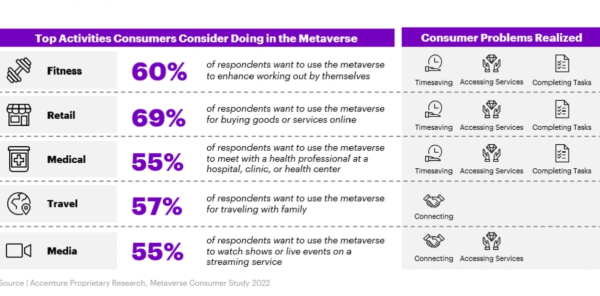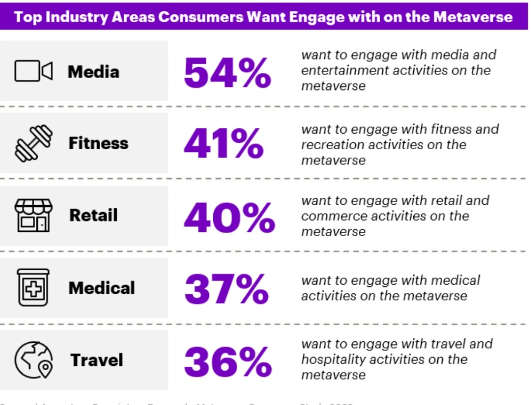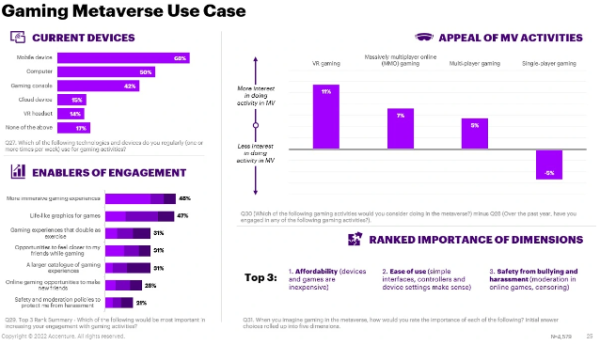Accenture Report Sees a Rise in a Consumer and Business Interest in the Metaverse
An Accenture report has found that there is increased interest in the metaverse by consumers and businesses. The interest in the metaverse is mostly built around the creator economy of the ecosystem as well as its utility in enhancing day-to-day tasks. The Accenture report predicts that the metaverse will power a $1 trillion commerce opportunity.
Accenture released the report at the CES 2023 tech trade show held yesterday in Las Vegas.
The report states that over half (55%) of the approximately 9,000 consumers it surveyed regard the metaverse as a business opportunity for creating and monetizing content.

A whopping 89% of C-suite executives surveyed in a parallel survey involving 3,200 C-suite executives said they believe the metaverse will play a key role in the future growth of their organizations. According to the survey, roughly 4.2% of company revenues, or approximately $1 trillion could be generated from metaverse experiences and commerce by the end of 2025.

The Accenture research findings found that 55% of consumers want to actively participate in the metaverse while 90% want to actively participate in the metaverse next year. The top features preferred by consumers include easy-to-use interfaces (mentioned by 70% of those surveyed), and access to a broader variety of applications (cited by 68%) while the more form features like flashy headsets were preferred by 55%. 55% of the consumers also want the ability to personalize avatars.
Metaverse preference varies according to age. Younger consumers prefer media and fitness metaverse experiences while older users went for health services rendered over the new immersive platforms. A common thread seen among all users is their desire to use the metaverse to enhance the experiences they are already involved in like working out of home (60%) or the improvement of interactions with health professionals (cited by 55%).
What Do Gamers Think About the Metaverse
According to the findings, gaming appeals to 59% of metaverse users. However, just 4% of the consumers surveyed regard the metaverse as a primarily gaming platform. 70% of those surveyed say they are planning to use the metaverse to access a large spectrum of offerings across various segments including retail, media and entertainment, healthcare, and travel.

51% of the gamers surveyed have had an experience with the metaverse already. The findings also show that gamers are three times more likely to experience the metaverse than non-gamers. Simply put, gamers have a greater metaverse awareness. They showed the highest level of awareness and interest in the metaverse. Close to 80% of the respondents surveyed in the Accenture report said that they had played video games. One in three of the gamers surveyed have played for over 10 hours a week. Gaming was the top metaverse use case for the respondents surveyed in the report with 27% citing it as their no1 use case.
More Details on Consumers and Businesses
Consumers are showing more interest in solutions that enable them to better complete day-to-day tasks and activities. Accenture senior managing director David Treat described the metaverse as a “continuum of technologies and human-centric experiences” that will unlock the next era of our digital lives and transform every aspect of business. He states that it is underpinned by the opportunities for new products and services as well as digital assets, and business models along with the technical capacity to convey a sense of expression and presence.
Accenture’s lead in software and platforms industry practice Kevan Yalowitz added that consumers are beginning to regard the metaverse as an essential tool capable of streamlining how they complete tasks and boost their productivity when it is integrated into their lives. Yalowitz says that businesses that can create tangible experiences addressing consumer needs in the core areas of interest will get an early-mover advantage in the rapidly evolving metaverse industry.
Accenture concludes that to fully take advantage of the metaverse opportunity, businesses have to be strategic about the business model changes that are happening as a result of the metaverse while at the same time roping in all the stakeholders to shape the metaverse experiences that they create.
Accenture suggests the following: –
- Businesses Must Be Creative and Keep Things Simple: Accenture suggests that businesses only develop those metaverse experiences that are within the mental models of users. Creativity will be crucial and this requires businesses to go back to the basics and build upwards. This, Accenture says, will enable businesses to focus on the right strategies and operating models for the metaverse.
- Begin Small and Focused: Accenture says businesses should take a rigorous and customer-focused approach to the metaverse that will service their needs artfully. Businesses must also put an emphasis on how to implement the metaverse in the various parts of the business.
- Engaging with the early metaverse building blocks: The ecosystems surrounding the metaverse and Web3 is developing rapidly and creating new opportunities to generate value. This can unlock new opportunities for businesses if they focus on the right areas rapidly but also thoughtfully.
Accenture’s findings on the metaverse is a product of two research products. Its first report surveyed 9,156 consumers and delves into the general attitudes, preferences as well as use-cases in the metaverse. Its second report is a mixture of recommendations, market analysis along with a parallel survey of 3,200 C-suite executives.
More Metaverse Buzz
Accenture says the buzz around the metaverse has built up considerably. In just the past year, over 100,000 articles were published on the subject.
However, according to Accenture, the business conversation around the metaverse has been on what the technology is capable of and not on the needs of end users. Of the more than 100,000 articles published on the metaverse in the past year, only 15% addressed consumer needs. This is what prompted Accenture to undertake the survey.
Consumers see the metaverse as an essential tool capable of streamlining how they complete their tasks and improve their productivity when the technology is integrated into their daily lives such as in paying bills, accessing services and productivity, or learning new personal skills.
For consumers, it is all about function over form. They want easy-to-use interfaces (cited by 70%), and a greater variety of applications (cited by 69%) among their top priorities. Just 55% cited flashy headsets and another 55% cited the ability to personalize their avatars.
Overall, consumers are looking for a broader set of tools that are simple and effective that can assist them in their day-to-day lives instead of some fantastic futuristic technologies and features that are not necessarily useful.
Beyond gaming, the Accenture report finds that consumer demand is building up in media, fitness, retail, health, and travel.
The Accenture survey was conducted on consumers of age 18+ in India, Brazil, the United States, the United Kingdom, China, and Japan.
The research found that consumers understand where they wish to use the metaverse and what they want to use it for. Their metaverse wishes are practical and connected to normal everyday things such as saving time, connecting with family and friends, accessing consumer services, and finishing everyday tasks.
According to Accenture, the businesses that will gain the early-mover advantage in the evolving metaverse are those that can offer solutions at the intersection of the “where” and “what”.
Fitness, cited by roughly 60% of the respondents, was the second most popular use case after media. Respondents who cited fitness said they wanted a fitness solution that will improve their in-home workouts. The top features cited by respondents for such a solution include personalized workouts (48%), workouts that are intuitive and engaging (39%), tracking and monitoring the fitness progress (27%), and the ability for users to connect to their fitness equipment and devices (26%).
The Accenture survey was geared at determining the primary devices for the adoption of a metaverse fitness solution. According to the survey, the top three included data/privacy protection (77%), affordability (77%), and ease of use (75%). There were no answers touching on technology. Unsurprisingly, consumers are more focused on the experiences and outcomes than on the underlying tech.
In terms of the demographic spread, Accenture found that those aged below 55 were more interested in fitness and media while those aged over 55 were more interested in medical and travel use cases.
Finally, the study found a direct correlation between consumers’ level of interest in specific use cases and their willingness to adopt and deploy metaverse solutions to these use cases. Because of this, Accenture recommends that businesses have a tactical approach and engage with the right consumers to determine what they need to develop.
https://virtualrealitytimes.com/2023/01/06/accenture-report-sees-a-rise-in-a-consumer-and-business-interest-in-the-metaverse/https://virtualrealitytimes.com/wp-content/uploads/2023/01/Accenture-600x450.pnghttps://virtualrealitytimes.com/wp-content/uploads/2023/01/Accenture-150x90.pngBusinessAn Accenture report has found that there is increased interest in the metaverse by consumers and businesses. The interest in the metaverse is mostly built around the creator economy of the ecosystem as well as its utility in enhancing day-to-day tasks. The Accenture report predicts that the metaverse will...Rob GrantRob Grant[email protected]AuthorVirtual Reality Times - Metaverse & VR
